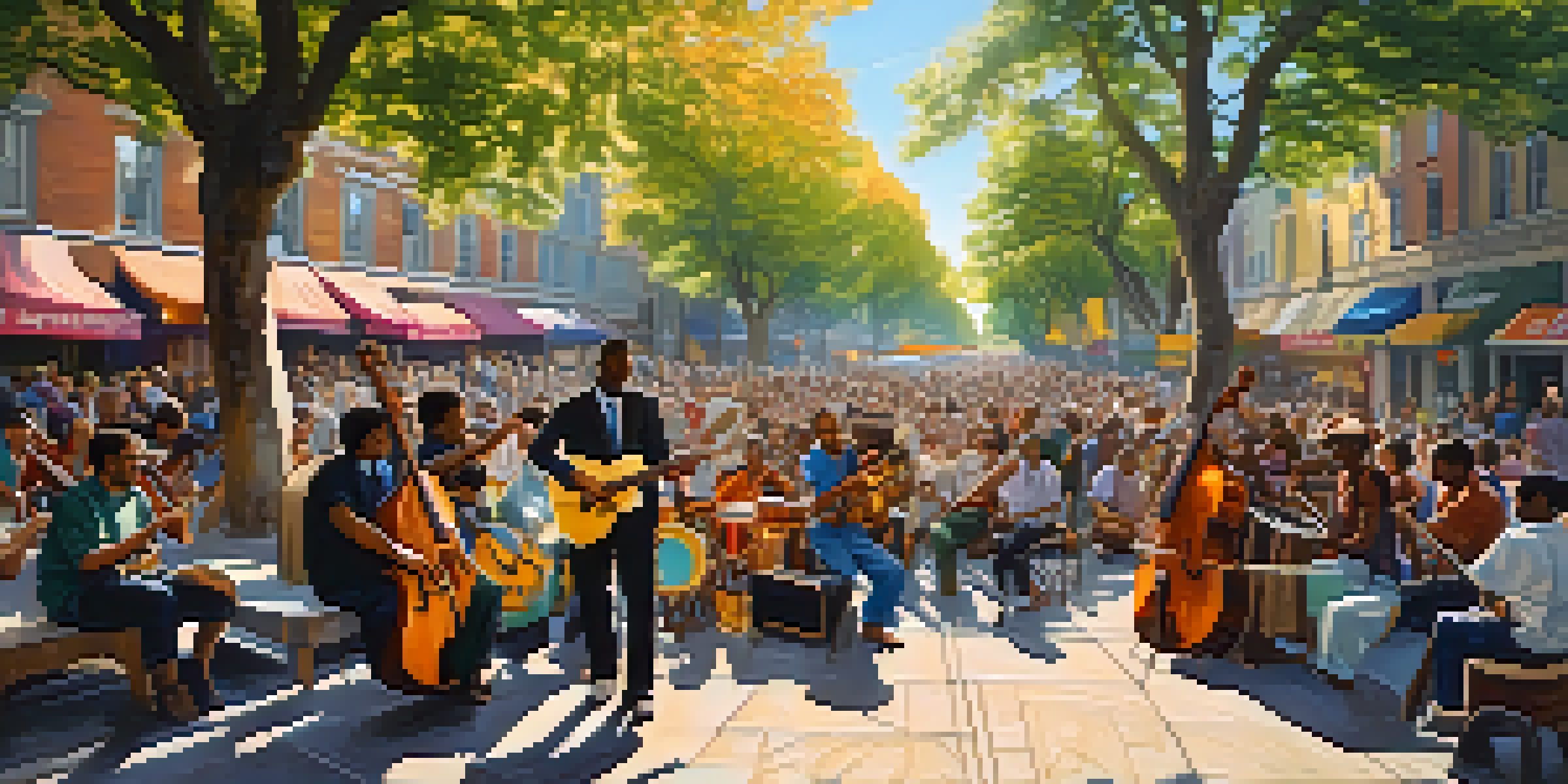Writing Songs with a Message: Using Music for Change

The Power of Music as a Catalyst for Change
Music has an extraordinary ability to evoke emotions and inspire action. From protest songs to anthems of hope, artists have long used their platforms to address societal issues. Think about the impact of Bob Dylan's 'The Times They Are A-Changin'' during the civil rights movement; it became a rallying cry for many.
Music can change the world because it can change people.
When musicians craft songs with meaningful lyrics, they tap into the collective consciousness, encouraging listeners to reflect on their own beliefs and actions. This connection can mobilize communities, as music often transcends cultural and language barriers. It’s a universal language that speaks to the heart.
By using their artistry to spotlight important issues, songwriters can create a ripple effect, inspiring others to join the cause. Whether it's climate change, social justice, or mental health awareness, music can serve as both a mirror and a megaphone for change.
Finding Your Message: What Matters to You?
Before you start writing, it’s essential to identify the issues that resonate with you personally. Think about what moves you, what angers you, or what brings you hope. This introspective process will help you craft lyrics that are authentic and impactful.

Consider your experiences and how they relate to the larger world. For instance, if you’ve faced struggles with mental health, writing a song about that journey can connect with countless others who feel the same way. Sharing your story can help break the stigma and foster understanding.
Music as a Change Catalyst
Music has the unique power to inspire action and unite communities around important social issues.
Once you've pinpointed your message, you can begin weaving it into your music. Remember, the most powerful songs often stem from genuine emotion and personal truth, making them relatable and memorable.
Crafting Lyrics that Resonate with Your Audience
Effective lyrics go beyond simple rhymes; they tell a story and evoke emotions. Use vivid imagery and metaphors to create a mental picture that draws listeners in. For example, instead of saying 'I'm sad,' you might express it as 'I'm a ship lost in a storm,' which paints a more relatable scene.
The role of music is to make people happy and to make people think.
Consider the tone of your message, too. A song addressing a serious issue like climate change might benefit from a somber tone, while a track advocating for social justice could be more upbeat and defiant. The emotional delivery will significantly impact how the message is received.
Ultimately, your goal is to create lyrics that not only convey your message but also resonate deeply with your audience. This connection can motivate listeners to reflect on their own actions and inspire them to make a change.
Melody: The Heartbeat of Your Message
While lyrics are crucial, the melody carries the emotional weight of your song. A catchy tune can make your message more memorable and encourage listeners to sing along. Think about how many people remember 'Imagine' by John Lennon, not just for its lyrics but for its hauntingly beautiful melody.
Experiment with different musical styles to find the right sound that complements your message. A folk tune might lend itself well to storytelling, while a pop beat can make a serious message more accessible. The right combination can amplify your impact.
Authenticity in Songwriting
Identifying personal experiences and emotions can help craft lyrics that resonate deeply with listeners.
Remember that the melody should align with the emotion of the lyrics. If your song addresses a heartbreaking topic, a soft, slow melody might be more appropriate than a fast-paced rhythm, ensuring that the message's weight is felt.
The Role of Storytelling in Songwriting
Storytelling is a powerful tool in songwriting, allowing you to create relatable narratives that illustrate your message. By weaving personal anecdotes or fictional tales into your lyrics, you invite listeners into a world they can connect with. For instance, a song about overcoming adversity can inspire others facing similar challenges.
Consider using characters or scenarios to bring your message to life. This approach not only engages your audience but also fosters empathy, as they see the world through someone else's eyes. It's all about creating a shared experience through your music.
Ultimately, storytelling adds depth to your songs, making your message more impactful and memorable. It transforms abstract themes into concrete experiences that listeners can relate to and learn from.
Collaborating with Other Artists for Greater Impact
Collaboration can amplify your message and broaden your reach. Working with other artists brings diverse perspectives and skills to the table, enriching your song's content. Think of the powerful duo of Lady Gaga and Bradley Cooper in 'Shallow,' which combined their talents to create a resonant message about vulnerability.
When collaborating, ensure that your partner shares a similar vision regarding the message. This synergy can lead to a song that not only sounds great but also carries a weighty, unified message. It’s about pooling your strengths to create something greater than the sum of its parts.
The Impact of Collaboration
Collaborating with other artists can enhance your message and expand your audience, creating a greater impact.
Additionally, collaborating can introduce you to new audiences. Each artist brings their fan base, which can help spread your message further and inspire more listeners to engage with the cause.
Using Social Media to Amplify Your Message
In today's digital age, social media is an invaluable tool for promoting your music and message. Platforms like Instagram, TikTok, and Twitter allow you to share your songs, engage with listeners, and raise awareness about important issues. Think about how viral a hashtag can become, rallying people around a cause.
Create content that resonates with your audience, whether it's behind-the-scenes glimpses of your songwriting process or clips of your performances. This engagement fosters a sense of community and encourages listeners to share your message with their networks.

Remember, the goal is to create a dialogue around your music. Encourage your followers to share their thoughts and experiences related to the themes of your songs, turning your music into a catalyst for meaningful conversations and change.